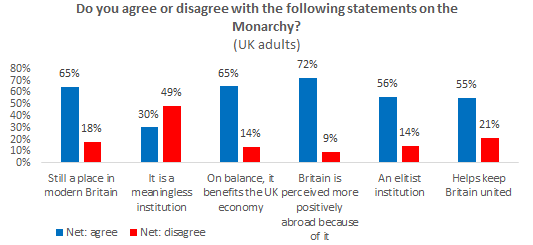Our longest reigning Monarch
Our longest reigning Monarch
The resounding note seems to be that, despite some reservations, the Monarchy remains popular among Brits. Over half (56%) of UK adults feel that if the Monarchy were abolished, the effect on Britain overall would be a negative one. This is unsurprising, when two thirds (65%) think that the Monarchy benefits the UK economy and just under three in four (72%) think that the perception of Britain abroad is made more positive by the Queen and the royal family.

The Queen
The feeling towards the Queen herself is particularly positive. Seven in ten (71%) say they are satisfied with how the Queen conducts her duties as sovereign, which include representing Britain at home and abroad, opening Parliament, attending key events and other major roles.
This continued when UK adults were asked to describe the Queen in three words: dedicated (37%) came top, followed closely by hard working (34%) and traditional (32%). The most negative words used to describe the Queen were old-fashion (17%) and outdated (15%).
The future of the Monarchy
With the Queen?s popularity, we looked ahead to the future and also asked UK adults what they thought the next monarch could improve on. Just over two in five (43%) think the next Monarch should try and connect more with the British public, 42% think the next ruler needs to be more progressive and a quarter (26%) think the next Monarch should be younger.
This reflects our findings on who UK adults think should succeed after Queen Elizabeth II, as half (53%) would prefer Prince William (53%) over Prince Charles (25%) to succeed as the next King. Additionally, aside from the Queen, the younger members of the royal family tend to rank higher as public favourites:
- t
- Prince William: 44%
- Prince Harry: 39%
- Queen Elizabeth: 37%
- Kate, Duchess of Cambridge: 32%
- Princess Anne: 12%
- Prince Philip: 12%
t
t
t
t
t
Opinium Research carried out an online survey of 2,003 UK adults. Results have been weighted to nationally representative criteria. The research was conducted from 21st to 24th August 2015.



